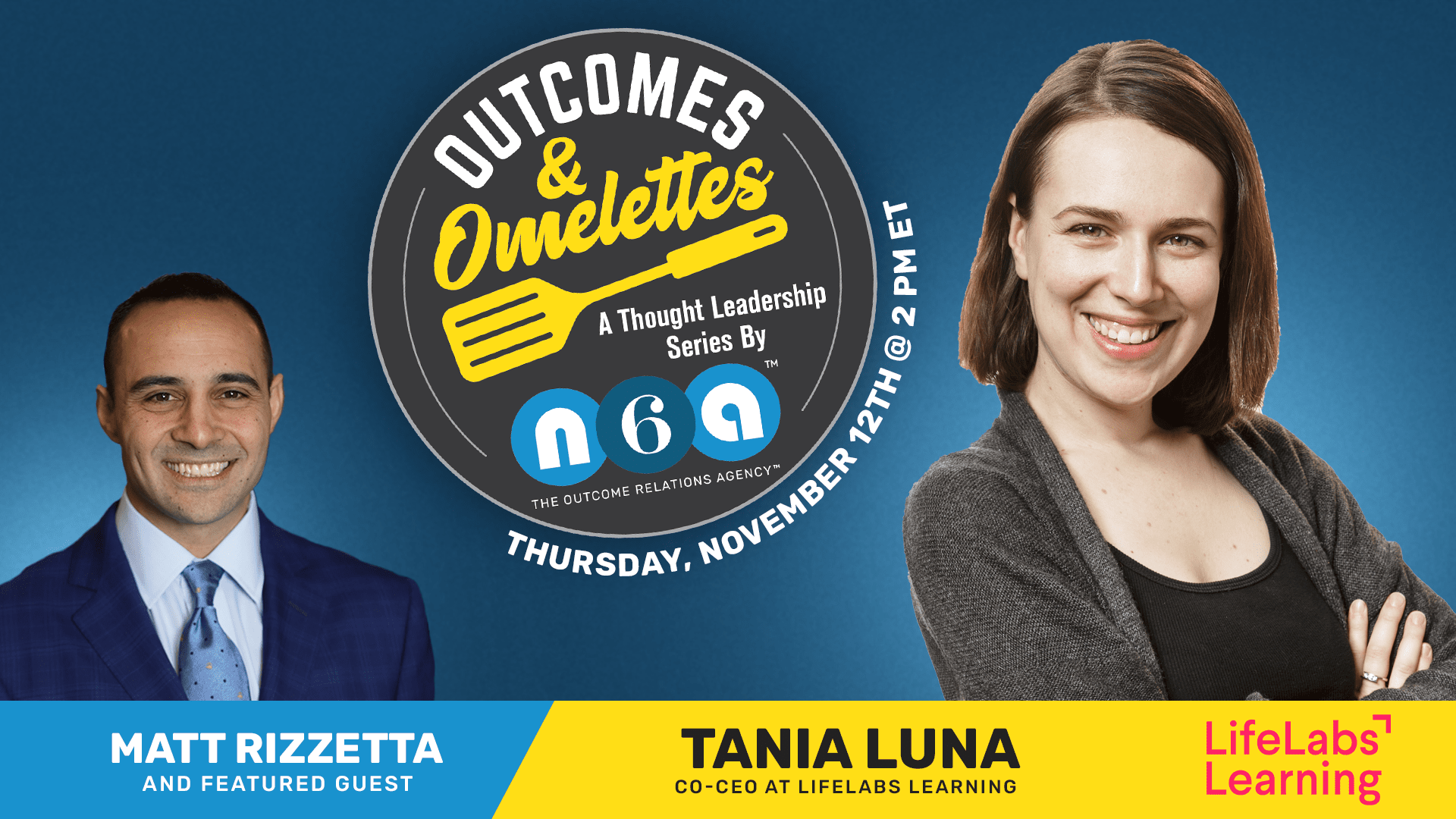Embracing the Unpredictable in the Virtual Workplace During COVID
Psychology researcher and leadership trainer Tania Luna joined us for the November 2020 edition of our Outcomes & Omelettes thought leadership series.
Our Outcomes & Omelettes thought leadership series returned in November, and we flipped the script a little bit. In this era of social distancing, we typically love to host our guests on a livestream to discuss each guest’s background and career journey. While we did hit on some of that this time, instead the focus was primarily dedicated to the hard-working N6Aers discussing challenges, best practices and insights related to the virtual workplace during the pandemic. But it wasn’t completely different — obviously our beloved make-your-own-omelette-station was still delivered to N6A-ers via a Seamless credit!
In this open and honest conversation, N6A CEO Matt Rizzetta was joined by Tania Luna, the co-CEO of LifeLabs Learning, a consultancy that specializes in training that provides rapid skill-building in leadership, inclusion, and collaboration. Luna’s work has been featured in dozens of media outlets including Psychology Today, Harvard Business Review, TIME, NPR, Wharton Business Radio, HuffPost, O Magazine, Mashable, and The Wall Street Journal and her TED talk has over 1.8 million views.
As a psychology researcher, leadership trainer, podcast host, and co-author of the book Surprise: Embrace the Unpredictable & Engineer the Unexpected, Luna’s unique voice and perspective on both professional and personal development helped the N6A team see through the pandemic work/life balance more clearly.
Here are a few of the key takeaways from our livestreamed O&O session, which is also available to watch above.
Overcoming COVID Productivity Struggles
It’s difficult to think that we’ve been working during this pandemic for nine months, and as we’ve settled into the new normal the galvanized teamwork spirit that typified the early days has somewhat tapered off.
Luna explained that the March/April period of the pandemic exemplified what she called an “acute stress” period, or a panic response with a flurry of activity. In the subsequent handful of months since then, a more dangerous fatigue of “chronic stress” may have set in.
Without the variety and stimulation of a pre-COVID workday when our brains are tuned to regular intervals, there’s a sameness to the challenges day in and day out, which could lead you to ask how can one thrive, grow, and connect when so much is uncertain yet predictable at the same time.
Luna explained that it’s important to understand the sources of stress in dealing with a variety of challenges, including enacting some sort of stop and start ritual to your day when the physical workspace doesn’t change; establish dark-time boundaries where teams know not to email, Slack, or call; or even create mental progress markers where you take heed of the small wins you’ve accomplished on a daily basis.
Being a More Successful Leader to Empower the Workforce
Luna saw the biggest differentiator for business leaders as making the implicit, explicit. It’s important to establish norms and be overt with parameters because, let’s face it, none of this is normal! It’s essential for leaders to embrace the underlying principle to talk about how to set norms so there’s a shared agreement, which is regularly much easier to do in person.
It’s also equally important in this non-normal time to debrief on what isn’t going right so that there’s a collective cognitive off-loading and opening up of team issues. Luna stressed that this shouldn’t consist of constant complaint sessions, nor should it just be a collective wallowing, but should be an open environment that constructively acknowledges potential negatives.
In balancing realism versus hope, Luna cited the Stockdale Paradox, which said, “You must never confuse faith that you will prevail in the end—which you can never afford to lose —with the discipline to confront the most brutal facts of your current reality, whatever they might be.”
Normalizing Mental Health Resources
A silver lining of the pandemic has been the widespread openness and normalization of addressing mental health in the workplace, especially when companies focus on benefits, wellness days, and create team wellness exercises such as yoga sessions for any participants feeling stranded.
Luna also said the same goes for being a good corporate citizen. In the pandemic and beyond, it’s important for companies to lead the way by thinking about how each can change the system from within, and reimagine corporate entities as an inclusive reflection of what they feel the world should be like.
Being a Better Professional After the Pandemic
Lastly, Luna spoke about the potential for hitting a wall with the monotony and the grind, but making it out as a better professional once the pandemic is over. She cited three constructive ingredients for professional growth.
- Reconnect with Meaning: Luna explained that most people think burnout is all about overwork, but it’s mostly about the loss of meaning in your work, or what she called “an existential vacuum.” To move forward, Luna said, “Ask what’s important with me, what you want to leave behind, what experience you want to collect, and who you want to have an impact on.”
- Forecast Forward: Control about what you can become, what bad habits to break and skills to dig into.
- Look Backward: Luna’s last message was to give yourself a “visual evidence of growth,” and a sense of progress, even by doing something as simple as writing out where you started versus where you’ve gotten to since the pandemic began.
Each Outcomes & Omelettes session is an educational and interactive discussion on each guest’s background and career journey to engage and inspire the N6A team. Check back soon for our next guest! You don’t know who will show up from the worlds of business, media, philanthropy, and beyond.

